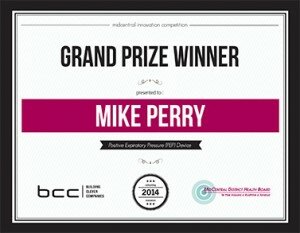 Things move fast in healthcare. New procedures, new equipment, new personnel – it’s an ever-changing environment and we all expect these changes to happen smoothly, efficiently and perfectly.
Things move fast in healthcare. New procedures, new equipment, new personnel – it’s an ever-changing environment and we all expect these changes to happen smoothly, efficiently and perfectly.
Change might come from innovation, but keeping up with it also requires innovation.
In late September, BCC launched the MidCentral District Health Board (DHB) Innovation Competition in an effort to uncover and develop DHB staff with ideas that could revolutionise their workplace. The competition was open for six weeks and by the time it closed on 31 October BCC tech transfer advisor Jane Donaldson had received 18 submissions.
“We think that’s a really good number of ideas to come from such a targeted population in the inaugural year,” she says.
Twelve staff who submitted ideas were invited to participate in a four-week idea validation programme. Donaldson says this is a condensed version of the Innovate programme with the focus on the key considerations required for implementation of ideas.
“We’re not necessarily working towards launching or growing a business, like we are in Innovate,” she says. “Some entries were medical devices but many of the ideas from the DHB staff were based on process improvements within the hospital. For example, we had a number of online solutions designed to take the place of things that are currently done manually such as patient scheduling and hospital asset tracking.”
Three of the invited 12 weren’t able to commit the time required to participate in the programme but the remaining nine worked through three weeks of idea validation steps, such as understanding the costs and benefits, regulatory requirements and impact on users. During the fourth week, the nine pitched their ideas to a panel of judges and on 4 December the winner – Mike Perry – was announced.
A respiratory physiotherapist, Perry has developed a novel Positive Expiratory Pressure (PEP) device.
“PEP devices are used to treat patients with certain lung conditions and impairments, like cystic fibrosis,” says Donaldson. “There are other PEP devices on the market but they are prohibitively expensive due to the fact that not every patient will get the same level of positive results.. Mike’s solution is a cost effective device that a patient could use on a trial basis instead of an unapproved, improvised device that some physiotherapists currently use..”
Perry will receive $10,000 worth of services to support the idea to progress. Donaldson says that BCC and the DHB will work with Mike to agree the next steps of product development but the money will probably go to a freedom to operate search, the development of a prototype and, possibly, to fund a clinical study.
“The judges really liked that Mike had taken his idea to a point where he had already investigated manufacturing. He had a clear design and had costs for injection moulding,” says Donaldson. “So the product was a bit closer to market than some of the others entered in the competition.”
While different from Innovate, the DHB competition is still about innovation.
“We expected to see a whole range of ideas, from hospital-based process improvements to new product ideas. And that’s what we had,” says Donaldson. “The competition connects well with our goal of creating an innovative and entrepreneurial city and region.”
Donaldson says that BCC and the DHB are already planning for the 2015 competition. She expects it to be open for submissions in September and October.
Posted by